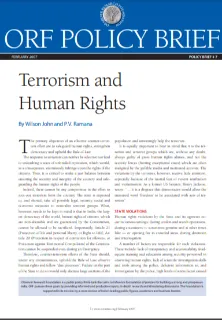The Policy Brief is based on the findings and recommendations drawn largely from a discussion hosted by Observer Research Foundation. Participants in the discussion included Gen (Retd) V.P. Malik, former Chief of the Army Staff and presently President,
The primary objectives of an effective counter-terrorism effort are to safeguard human rights, strengthen democracy and uphold the Rule of Law. The response to terrorism can neither be selective nor lead to unleashing a wave of unbridled repression, which would, as a consequence, enormously infringe upon the rights of the citizens. Thus, it is critical to strike a just balance between ensuring the security and integrity of the country and safeguarding the human rights of the people.
Indeed, there cannot be any compromise in the effort to root-out terrorism from the country. The state is expected to, and should, take all possible legal, security, social and economic measures to neutralise terrorist groups. What, however, needs to be kept in mind is that in India, the largest democracy of the world, human rights of citizens, which are non-alienable and are guaranteed by the Constitution, cannot be allowed to be sacrificed. Importantly, Article 21 (Protection of life and personal liberty, or Right to Life), Article 20 (Protection in respect of conviction for offences, or Protection against Testimonial Compulsion) of the Constitution cannot be suspended even during an Emergency.
Therefore, counter-terrorism efforts of the State should, under any circumstances, uphold the Rule of Law, observe human rights and follow “due processes”. Failure on the part of the State to do so would only alienate large sections of the population and unwittingly help the terrorists.
It is equally important to bear in mind that it is the terrorists and terrorist groups which are, without any doubt, always guilty of gross human rights abuses, and not the security forces (barring exceptional cases) which are often maligned by the gullible media and motivated activists. The violations by the terrorists, however, receive little attention, especially because of the mortal fear of violent retribution and victimisation. As a former US Senator, Henry Jackson, wrote: “… It is a disgrace that democracies would allow the treasured word ‘freedom’ to be associated with acts of terrorists”.
The findings and recommendations in this policy brief are drawn largely from the discussion which the Observer Research Foundation hosted on August 29, 2006. Participants in the discussion included Gen (Retd) VP Malik, former Chief of the Army Staff and presently President, ORF Institute of Security
Studies, Mr Vikram Sood, former chief, Research and Analysis Wing and presently Advisor to ORF Chairman, Maj Gen (Retd) Afsir Karim, former member of the National Security Advisory Board, Maj Gen (Retd) Ramesh Chopra, Mr K S Subramanian, IPS (Retd), Mr Zafarul-Islam Khan, Editor, The Milli Gazette, New Delhi, Ms Swati Mehta, Project Offi cer, Commonwealth Human Rights Initiative, New Delhi, Mr Wilson John, Senior Fellow, ORF, and Dr PV Ramana, Research Fellow, ORF.

 PDF Download
PDF Download



 PREV
PREV

